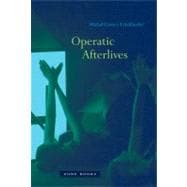
Note: Supplemental materials are not guaranteed with Rental or Used book purchases.
Purchase Benefits
What is included with this book?
| Acknowledgments | p. 11 |
| Introduction | p. 13 |
| Singing | |
| Death Song | |
| Afterlife: A New Configuration of Singing | |
| Embodiment | |
| Temporality | |
| Aesthetic Orbit | |
| Inside the Book | |
| Prologue Traces | |
| Giacomo Puccini, Le villi (1884) | p. 35 |
| Death, Afterdeath | |
| Substitute | |
| Dance Detour | |
| Voice Recognition | |
| Returned Singing | |
| The Afterlife of Maria Callas's Voice Franco Zeffirelli, Callas Forever (2002) | p. 45 |
| Bygone Voices | |
| Regaining the Lost Voice: First Attempt | |
| Re-voicing | |
| Vocal Pairs: An Overwhelmed Body | |
| Body-in-Voice | |
| Regaining the Lost Voice: Second Attempt | |
| Tosca | |
| Unsightly. Unheardly | |
| The Voice's Afterlife | |
| Sung By Death Giacomo Puccini, Gianni Schicchi (1918) | p. 77 |
| Better End | |
| How Comedy Ends | |
| Clues about Life and Death | |
| Dramatic and Musical Continuity | |
| Curious Dating of the Tale in the Libretto | |
| Inaccurate Historical References in the Libretto | |
| Symmetrical Impersonation | |
| Undifferentiating the Living from the Dead | |
| Shades | |
| Morphing Music | |
| 3-2-1 Schicchi | |
| Interlude Opera Ghosting | |
| Michael Ching, Buoso's Ghost: Comic Sequel in One Act after Puccini's Gianni Schicchi (1996) | p. 109 |
| Dybbuk: Between Voice and Song Lodovico Rocca, Il dibuk (1934) | p. 115 |
| A Soul Has a Voice | |
| The Divine's Voice | |
| The Dybbuk, or Between Two Worlds | |
| Duet within Oneself with the Dead about the Unborn | |
| I Am Song | |
| Interlude Voice Replacement Puccini, Gianni Schicchi, Rocca, Il dibuk | p. 149 |
| Singing and Disappearing Angels Mordecai Seter, Tikkun Hatsot (Midnight Vigil, 1961) | p. 151 |
| Silent Singing | |
| Dying Singing | |
| Vertical Echoing | |
| Crowning | |
| Lamenting | |
| Dying Out of Song: Midnight Vigil | |
| Allowing a Voice to be Heard | |
| Mystic Sounds | |
| Composing A Hearing | |
| Vocal Ideas | |
| Pargod: Celestial Veil | |
| Singing Evanescence | |
| Coming to an End | |
| "Real" Prayer | |
| "Real" Tikkun | |
| "Unreal" Prayer | |
| Failure | |
| No Redemption | |
| Our Death | |
| Silence | |
| Epilogue Cartoon-Animated Opera The Whale Who Wanted to Sing at the Met (Disney, 1946) | p. 197 |
| Notes | p. 207 |
| Index | p. 247 |
| Table of Contents provided by Ingram. All Rights Reserved. |
The New copy of this book will include any supplemental materials advertised. Please check the title of the book to determine if it should include any access cards, study guides, lab manuals, CDs, etc.
The Used, Rental and eBook copies of this book are not guaranteed to include any supplemental materials. Typically, only the book itself is included. This is true even if the title states it includes any access cards, study guides, lab manuals, CDs, etc.